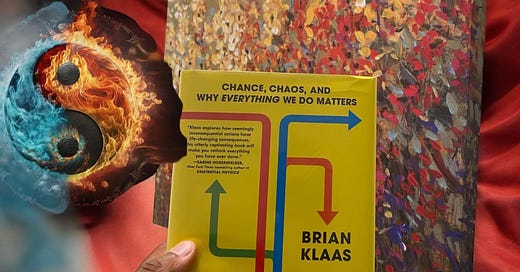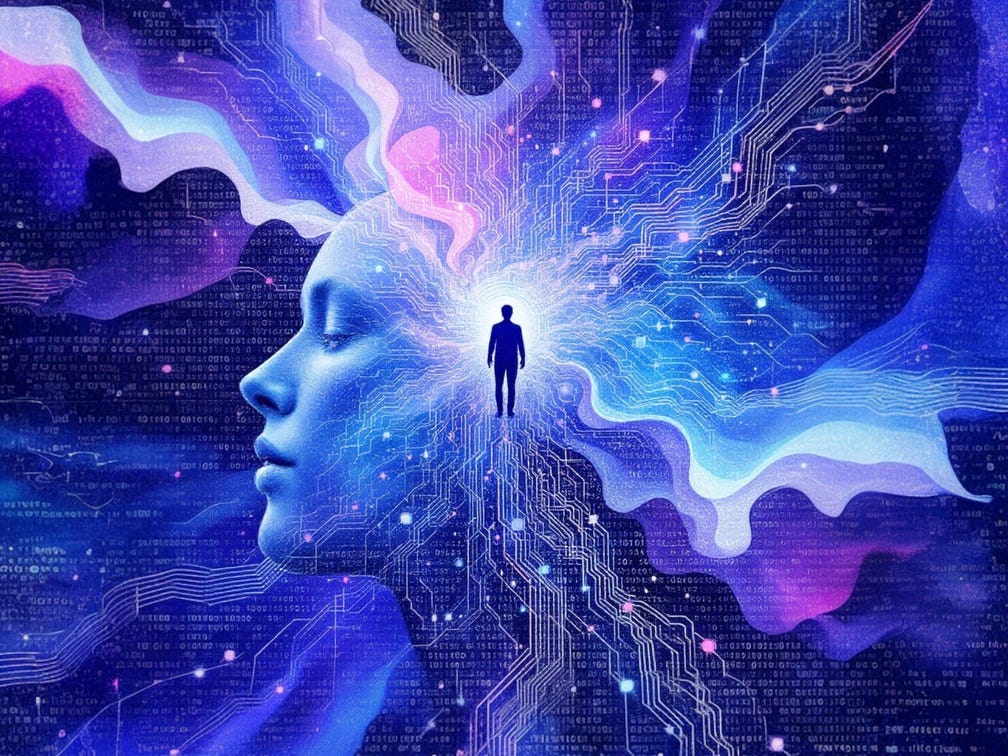“Recognizing that often meaningless, accidental outcomes emerge from an intertwined, complex world is empowering and liberating. We should all take a bit less credit for our triumphs and a bit less blame for our failures.”
Brian Klass, author of the book “Fluke: Chance, Chaos, and Why Everything We Do Matters.”
For years, I bought into the well-meaning, sugar-coated Kool-Aid that “everything happens for a reason.”
It’s the kind of phrase you hear when your world collapses, like after a breakup, a layoff, or the unexpected death of someone you love. It’s passed around like a bandage for spiritual wounds, a spoonful of hope to help the chaos go down.
But somewhere between my third heartbreak and my fifth reinvention, I stopped sipping. Now, I throw shade on that notion. With this, I’ve come to this deeply uncomfortable conclusion…
….Everything doesn’t happen for a reason. Everything just… happens.
So what if our lived experiences are not part of some grand, cosmic screenplay where the universe is the all-knowing director but are accidental, arbitrary, and precarious.
If I’ve learned anything from wandering through cities, careers, and crises, it’s that the forces shaping our lives are less divine plan and more dice roll. Lightning bolts of change—sudden, spectacular, and indifferent—often land on our lives with zero explanation.
I used to stand at the edge of Lake Michigan in Chicago, watching those bolts fork across the sky like the Tao’s own jagged signature. There was no pattern. One hit the Sears Tower (we Chicagoans still call it that). Another split a tree. A third illuminated nothing but open water. Luck, like lightning I believe, strikes without warning, without fairness, and without moral purpose.
This may sound bleak. But strangely, I find it freeing.
We’ve been conditioned to frame our pain through the lens of order. We want things to mean something—especially the things that hurt. We say it’s “all part of the plan” because randomness is terrifying. Yet, if we take off the blindfold and look honestly at life, we’ll see that much of what shapes us—where we’re born, who crosses our path, when opportunity knocks—is a matter of chance.
You can be brilliant, disciplined, and kind and still get sucker-punched by life. You can be careless, cruel, and clueless and still land on top. How do we reconcile that? We don’t. We can only surrender to it.
The I Ching, the ancient Chinese Book of Changes, teaches us that life is an ever-flowing river of Yin and Yang—light and dark, gain and loss, chaos and order. It doesn’t offer us certainty. It offers us orientation. It doesn’t promise that things will make sense. Rather it helps us move through the senselessness with grace.
Each hexagram is a mirror reflecting a moment, a mood, a motion in the universe—not a fixed destiny, but a fleeting condition. You consult the I Ching not to find out “why” something happened, but to understand “what now?” It’s a manual for dancing with randomness, not resisting it.
Hexagram 29, for instance—“The Abysmal”—reminds us that danger and uncertainty are part of the natural order. It advises perseverance through difficulty, not around it. Hexagram 51—“The Arousing (Shock)”—represents the sudden bolt of thunder, the jolt of change that startles us awake. These aren’t lessons in logic. They’re invitations to ride the wave without expecting it to behave.
What if we started looking at life not as a puzzle to be solved but as a mystery to be lived? What if instead of assigning meaning to every twist of fate, we held space for the possibility that we may never know the reason—and that this doesn’t diminish the value of our journey?
Here’s what I’ve come to embrace: if luck is real—and I believe it is—then so is humility. And with humility comes presence. We show up not because the stars have aligned, but because we are here.
We stay curious, not because we know what’s next, but because we don’t. And we extend compassion—to ourselves and others—not because it earns us good karma points, but because it’s the only sane response to a world that doesn’t owe us clarity.
If we truly internalize the idea that randomness is the rule, not the exception, our lives shift. We stop blaming ourselves for the lightning strikes. We stop resenting others for being chosen when we were not.
We begin to live in the now, not the what if. We stop asking “Why me?” and start asking “What now?”—which is, in my experience, a far more powerful and honest question.
I’m not saying throw all intention to the wind. I believe in effort, integrity, and showing up fully. But I no longer delude myself into thinking that effort alone steers the ship. Sometimes the tide carries us elsewhere. Sometimes the wind dies down. Sometimes we are lucky. And sometimes we are not.
So yes, I throw shade on the feel-good comfort food of “everything happens for a reason.” I replace it with something messier, grittier, but ultimately more truthful: Life happens.
The good news is that we get to choose who we are in response. That, to me, is the real miracle—not that things make sense, but that we can still make something meaningful from the senseless.
And maybe that’s all we’ve ever been asked to do.
If the daily Chocolate Taoist nomadic wisdom lights up your day, fuels your mind, or gives you a fresh perspective, I’d love your support as a paid member!
Or, if you’re feeling generous, drop a little (or a lot) of dirty chai latte love my way—every bit helps keep this Taoist journey flowing.
I’m committed to delivering high-quality, thought-provoking features straight to your inbox—no paywalls, no fluff, just raw, unfiltered wisdom on what it means to be human in today’s paradoxical, mysterious, and uncertain world.
Your support fuels my full-time mission, and I appreciate every single contribution. Let’s keep this energy going!
Diamond Michael Scott
aka The Chocolate Taoist







TDCTaoist ~
Thank you for getting up this morning and posting t.h.i.s
📝
I wrote your quote in my journal,
“We want things to mean something — especially the things that hurt.”
Then added,
“We want to mean something — especially when we are hurting.”
📝
The brief allusion to tide and wind reminds me of an early morning canoe trip across the Columbia River near Cascade Locks to Stevenson. As the warm morning air from the east pushed thru at sunrise, the mirrored surface developed small white caps.
🌬️🌊
Then the dam a few miles downstream opened the flow, and there I was! I was young, strong, 💪 with powerful deep strokes 🛶 and pointed in the right direction. I watched my town slip by, only a hundred yards away.
A few hours later, a friend with a pickup 🛻 retrieved me from Eagle Creek fish hatchery.
🤦
Such was my experience of good intentions and planning.
Yes, and. So much of what you wrote is incredibly helpful for living with presence, in the moment, choosing how we live and respond. And… What if instead of seeing life as either/or randomness or screenplay, what if it is both? You speak a lot about lightning in this piece. Have you ever come across the book Wolf's Message by Suzanne Giesmann? You might find it interesting, especially given the place lightning has in the book. It is not fiction. Wolff was a young man living in Massachusetts. This book has just been made into a documentary and Suzanne and his parents will be traveling the countryin the next few months as the documentary is being shared. I find his life very compelling! I'd love to know what you think. I hope you create a beautiful day, Diamond!